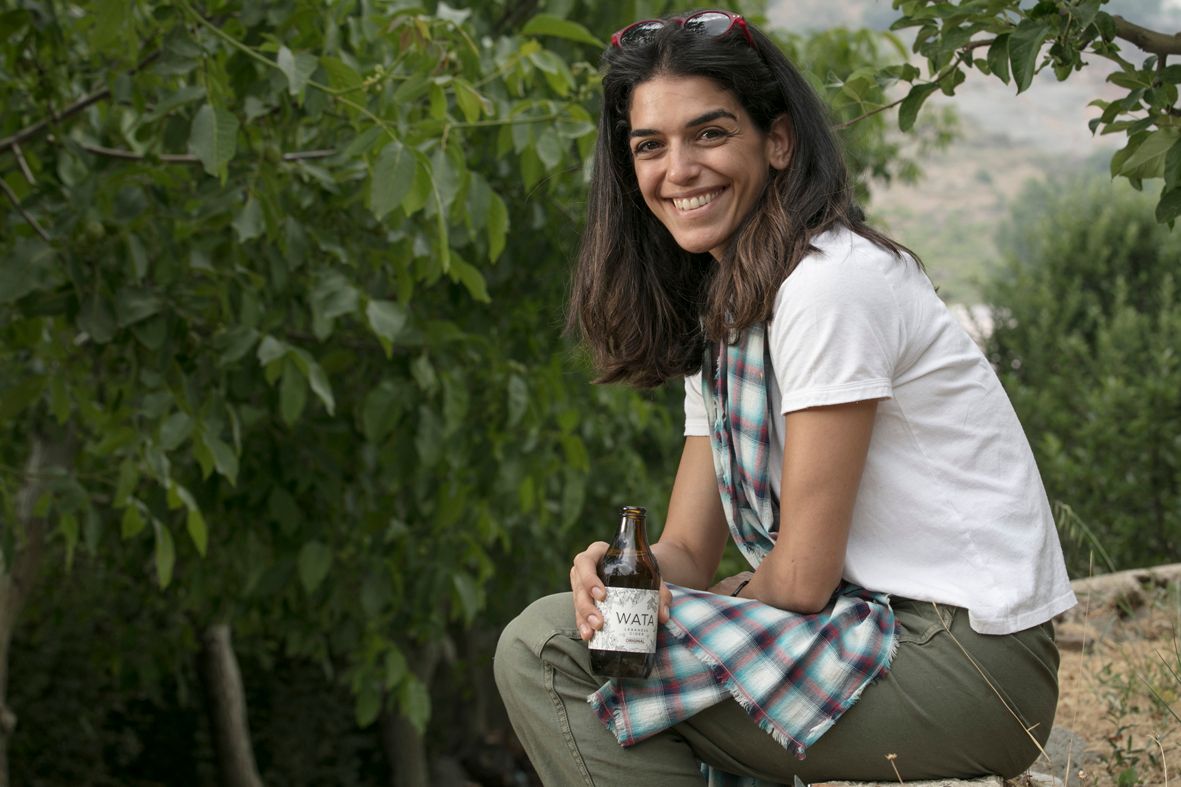Can you tell us about your background and how you got into the drinks industry?
I was born and grew up in Lebanon in a family of industrials and philantropists. I have specialised in Landscape design and agriculture engineering from the American University of Beirut (AUB) in 2006 and obtained a Masters in International Development from London School of Economics (LSE) in 2009. For more then 10 years I have juggled between two passions: my passion for development and social studies working for more then 10 years for the UN and governmental institutions in Lebanon and the Arab world; and second my passion to performing arts working as mass choreographer on a multitude ofmass events and Olympic ceremonies around the world.
I never had any experience in the drink industry prior to starting WATA. I only had love for our family orchard in Wata el Jawz were we have spent most of our childhood summers, love for our country, and an appreciation to terroir, craftsmanship and finesse.
Why did you want to make cider?
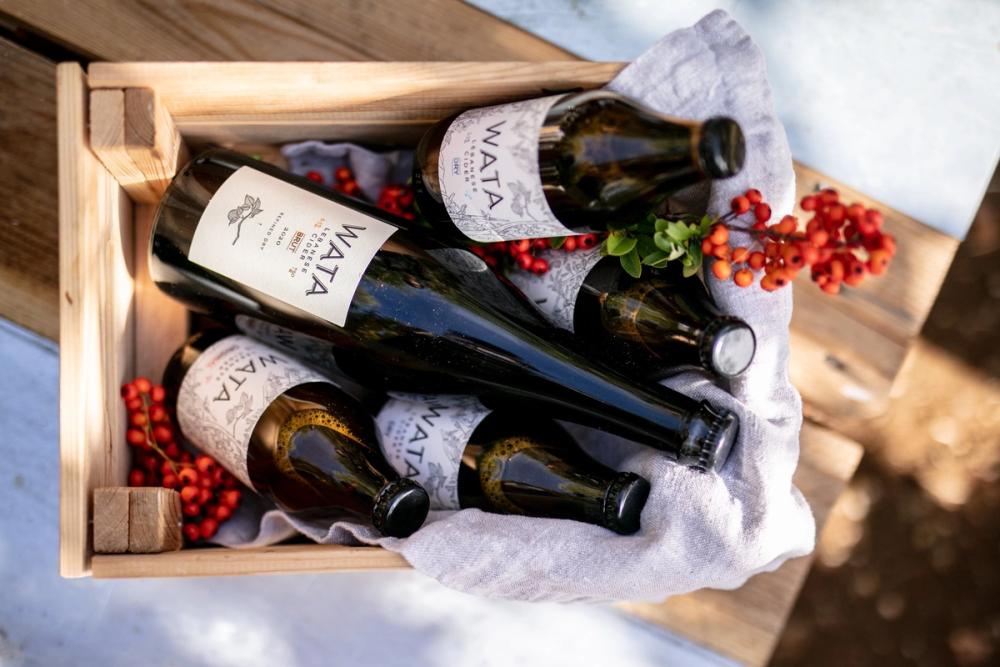
WATA Cider is helping promote Lebanon as a preium cider-producing country
I always believed in the potential of producing cider from our Lebanese apples since I was a university student at AUB, and dreamt of going back to working in the terroir and connecting back to the land.
Growing up in an Francophone country, we only encountered cider in a famous creperie in Lebanon; very traditional, cidre bouchee cider. It was the only drink we were allowed a tiny sip during our Sunday lunches with my parents as it was quiet low in alcohol around 2-3% abv.
During my years at the London School of Economics (2008-2009), and specially when I was working for the London Summer Olympics (2012) (I was part of the production team that put together the ceremonies of both the Olympics and Paralympics), I realised how modernised was the approach to cider in the anglo saxon culture -unlike the cider we knew; small bottles, attractive designs and totally integrated in modern lifestyles.
Following the apple crisis that hit Lebanon in 2015, when a combination of non competitive apples and regional turmoil had a huge hit on our export volumes endangering the livelihood of a large community, I started looking more seriously at setting up a micro-cidery in the family orchard. I saw cider as a sustainable solution to our apple industry and its community. But also one that would add value to our national industry and F&B scene renown for its quality produce and innovation.
How did you learn to make cider?
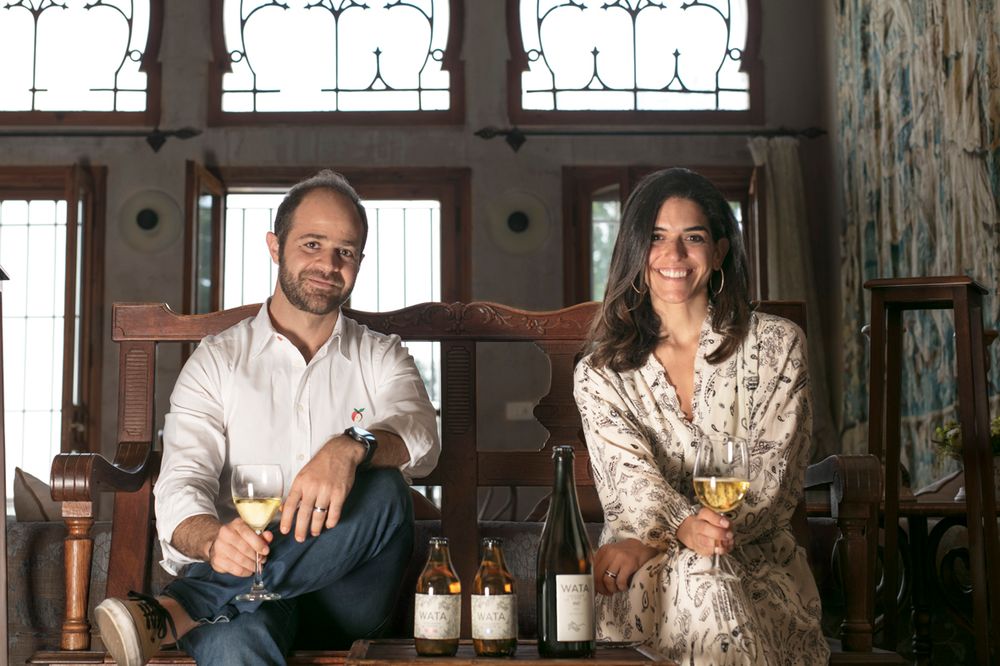
Soha Frem and her husband Ramzi, the couple behind WATA Cider
With the encouragement of my husband Ramzi and family, I finally decided to leave my UNjob in 2017. I pursued cider-making training with renowned expert and cider maker Peter Mitchell in the UK. We pressed our first vintage in 2017, and have been learning ever since the craft of cidermaking. I don’t think there is a point in time where you feel you have learned everything. It is a constant daily quest to bring out the best of each vintage and each apple varietal.
Following two years of R&D, WATA was launched in July 2019. This phase included micro-fermentation on all available apple varieties on our orchard and in surrounding regions, focus groups across ages and background in order to identify the preferred Lebanese palette vis a vis modern ciders, and market studies for cider positioning in the Lebanese markets.
You are working with apples from the Wata orchard in Mount Lebanon- why is this such a special place to grow apples and make cider?
The Wata orchard was planted by my grandparents and has been growing premium dessert apples since 1960 at an altitude of 1400m, in an ideal microclimate: bright autumn days, white winters, soft springs and warm summers, with 300 days of sunshine.
Wata el Jawz is a village in Mount Lebanon. Mount Lebanon constitutes 35% of apple production in Lebanon - the second biggest after the north of Lebanon.
Apple varieties in this region, and in the rest of Lebanon, were introduced by Jesuit Monks in 1800s and from immigrants returning to the country after World War II.
The varieities introduced – today considered the traditional varieties in Lebanon - include the Starking Delicious, Golden Delicious and Mouwachah (a big sour apple we enjoy during August with salt, a perfect accopaniement to beer and cider). In recent years new varietals were introduced on the market in order to increase the competitiveness of the apple market in Lebanon including: Gala, Fuji, Scarlet, Granny Smith (that we have recently started growing in our orchard as we love the soureness it brings forward to our ciders) and others.
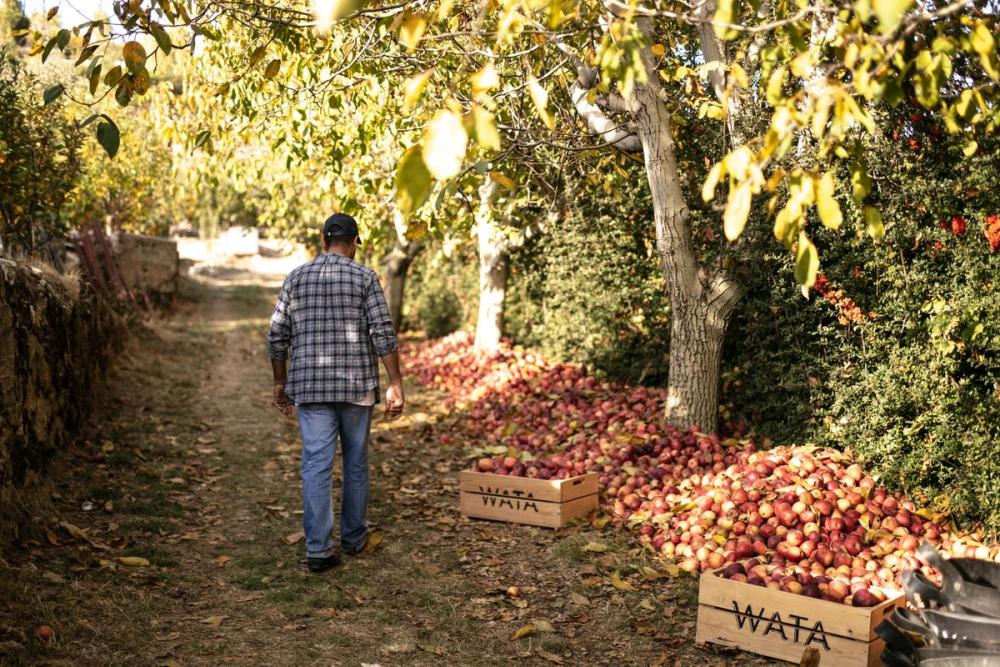
The orchards and the apples where WATA Cider comes from
WATA not only represents an ideal micro-climate for apple production, but sits at proximity to various natural reserves, rural tourism and main cities. It is at 30 minutes drive from the mediterranean sea and 20 minutes drive to Mount Sanine and the biggest ski resort. Its location made WATA very accessible, and has helped in creating connections with consumers, raising awareness about cidermaking and cider culture. A main objective for us in WATA.
The apples at WATA are at the forefront of cider culture in Lebanon today. Thanks to WATA Cider, Wata el Joz’s and surrounding villages apple are now known for cider making. WATA ciders and apples have put Lebanon for the first time in its history on the map of best producing cider making countries. Wata el Joz is today a reference region for cider making.
What makes Lebanese cider different from other countries?
In Lebanon, we only grow desert apples. In comparison with cider apples, desert apples are sweet, acidic with very light tannins. The most phenolic apple we use is Granny Smith.This leads to very crisp, light to medium bodied ciders with a moderate finish. Ciders we produce at WATA have been classified by a variety of international experts as “winey” ciders, comparable to the refreshing quality of white wine and that can range from spicy citrus notes to a more sibtle acidity.The aromatics can be floral, fruity or even mineral, depending on the apple variety used and the cider making techniques employed.
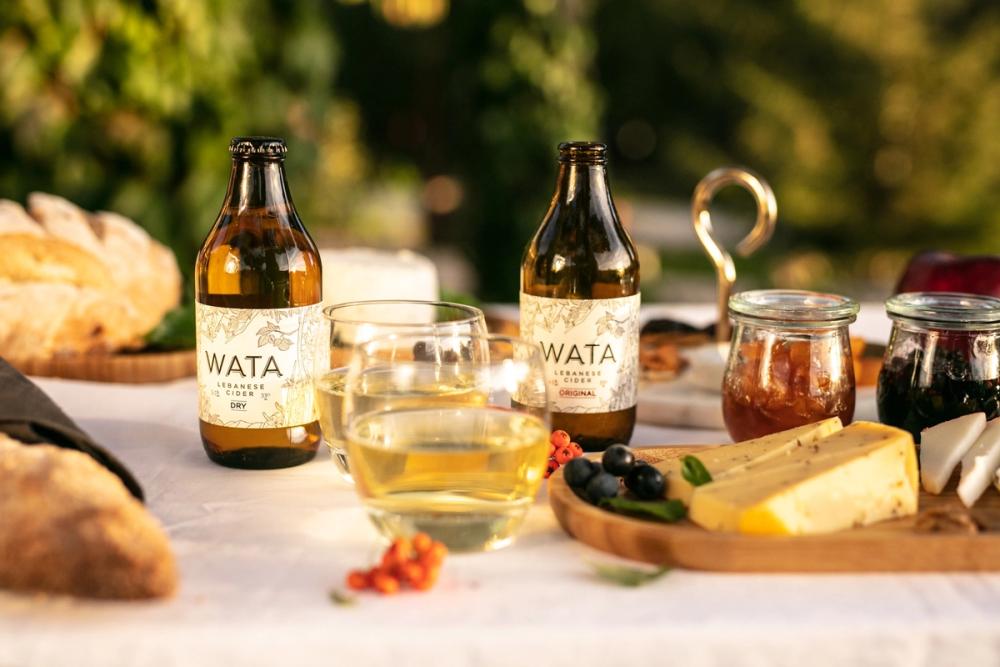
WATA Cider is producing a range of premium gastronomic-style cider
Consumers enjoy our ciders as a fine, lighter alternative to white wine.
Is there a problem with over supply of apples in Lebanon and how are you hoping to help?
There is indeed a problem with over supply of apples. And this exact problem was the trigger that pushed me to venture into the adventure of cider making and WATA, as a viable solution to the apple crisis in Lebanon.
According to FAO, apples are planted on a total area of 13,604 hectares (ha). Lebanon produces around 153,151 tons of apples annually, which constitute 23% of total Lebanese fruits production.
The dominant apple varieties in Lebanon are the Starking and Golden Delicious. These cultivars have put Lebanon’s name on the international market as apple producer. However, these varieties are no longer appreciated by international markets. New varietal have been introduced by private companies and NGOs to increase the competitiveness of the market including: Gala, Scarlet, Granny Smith and Fuji. Competitiveness is further constrained by high production costs from inefficient farming and post-harvest practices, inappropriate infrastructure and cold storing and sorting facilities.
Regional turmoil has further exacerbated the problem. First, the war in Syria in 2011 and the closure of Nassib border in 2014 caused the export market for Lebanese apples to stagnate, knowing that most Lebanese apples were exported to Syria or through Syria to other Arab countries. What aggravated the crisis is the political tensions between Lebanon and Gulf countries at some point that further decreased exports.
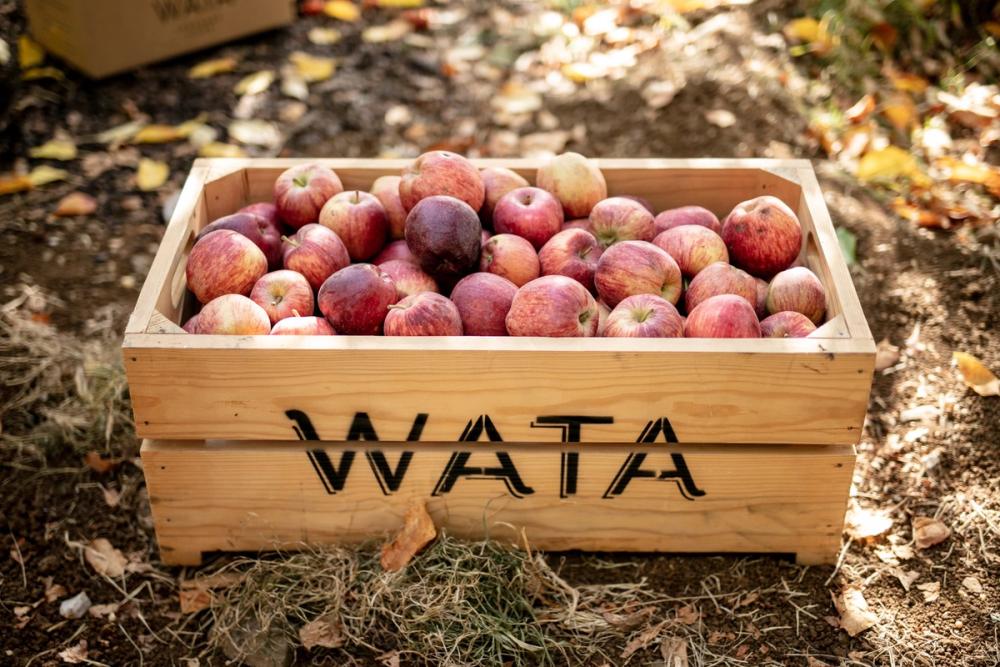
Cider making is helping to provide a new market for Lebanon's troubled apple growers
The decrease in exports coupled with an increase in imports have led to a surplus in apples in Lebanon, pushing apple prices down. The price of a crate decreased by five folds in two years, making it impossible for the farmers to recoup the cost of plowing, trimming, pesticides, fertilizers and storage. Small farmers couldn’t sustain their apple crops; at the mercy of big traders they sold their produce at a loss as they do not have the financial capacity to store them in refrigerators.
Beside apple cider vinegar and homemade jam, the Lebanese cuisine did not do much to integrate the fruit into everyday commodities. With a wealth of apples at our feet, and a passion for agricultural sustainability, we had to find a solution to an apple crisis that was threatening to transform our ecosystem and endanger the livelihood of many. WATA Cider was created to find a viable solution to the apple crisis. Today WATA purchases apples from five different small scale farmers.
What sort of ciders are you making and why?
We produce five different cider blends to satisfy the various consumers’ palates and increase the versatility of experiences when it comes to accessibility, pairing cider with food or introducing it with mixology. They range from extra dry to sweet , light to medium bodied, blend of varietal to single varietal, pure cider base to fruit infused and with aromas ranging from spicy, citrusy, fruity and floral.
- WATA original, 330ml, 4.5%, Fruity: This the first recipe and stemmed from the R&D we have divised when we first started with WATA. A very nicely balanced cider, a blend of three apples (Golden/Starking/Granny). The aroma is fruit-forward with fresh ripe apple notes and hints of spices. The mouthfeel is smooth, with a refreshing effervescent mousse. This is a light-bodied, medium sweet cider with a perfect balance between bright acidity and a sweet finish. Great to pair with fatty meats, spicy food, cheeses and cold cuts.
- WATA dry, 5.5% , Extra Dry : This cider was developed from consumers request for a dryer cider. A two variety cider (Starking / Golden). The aroma is that of fresh tropical fruits. The mouthfeel is clean, with elegant citrusy notes and fine tannins that provide a crisp finish. Perfect to pair with oysters, sea food, white meat and salads.
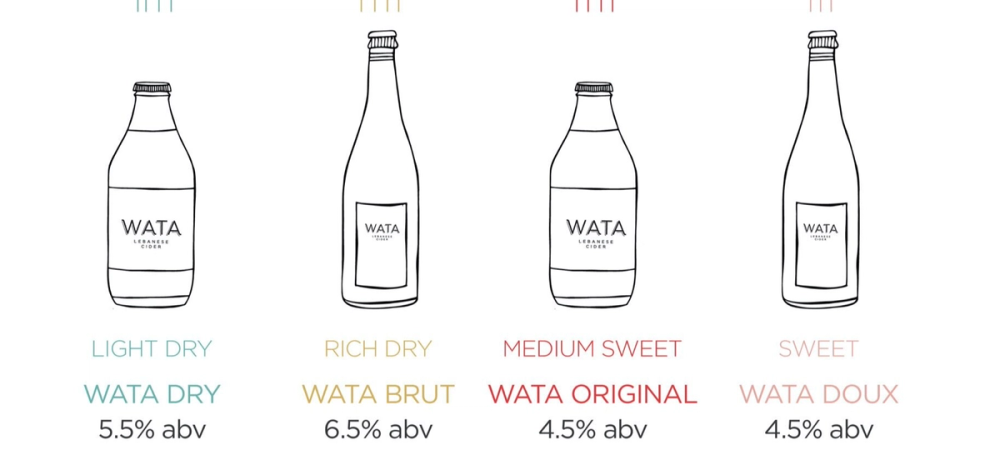
- WATA Brut, 7.5% Refined Dry, Single Varietal (Starking Delicious): Filled with delicate, tiny bubbles, this is a robust cider on the palate and finishes with great length. The mouthfeel is complex, performing a symphony of peaches, roses and green apples. A refined dry cider matured for more then a year on its lease. An all year companion to aperos and brunches.
- WATA Doux 4.5% Refined Sweet: Three apple varieties (Starking, Golden, Granny):This is a medium bodied cider, with a silky mouthfeel and refreshing effervescent mousse. It highlights the aromas of our tangy Wata apples and balances them out with notes of sweet caramel. A refined sweet cider matured for more then a year on its lease. Pairs beautifully with spicy food, fatty meats and strong cheeses. Can simply be enjoyed as a desert.
- WATA, Light Berries 3.5% : Itwas created to offer a cider with lower alcohol levels. Very light bodied, infused with freshly squeezed black mulberries from our orchard (Shami berries – indeginous to the Levant region). This Cider is only released during summers with the berries season; A “Sunkissed Edition”.
What is your approach to making cider?
It’s very much a similar approach to winemaking.We focus meticulously on every detail from bud to the cider bottle. Each apple variety is hand picked and pressed separately. Cold fermentation, with an emphasis on longer durations, is key to developing rich aromas. We allow our base cider to mature on its lees for a period ranging from six months to one year, firmly believing in the value of maturation.
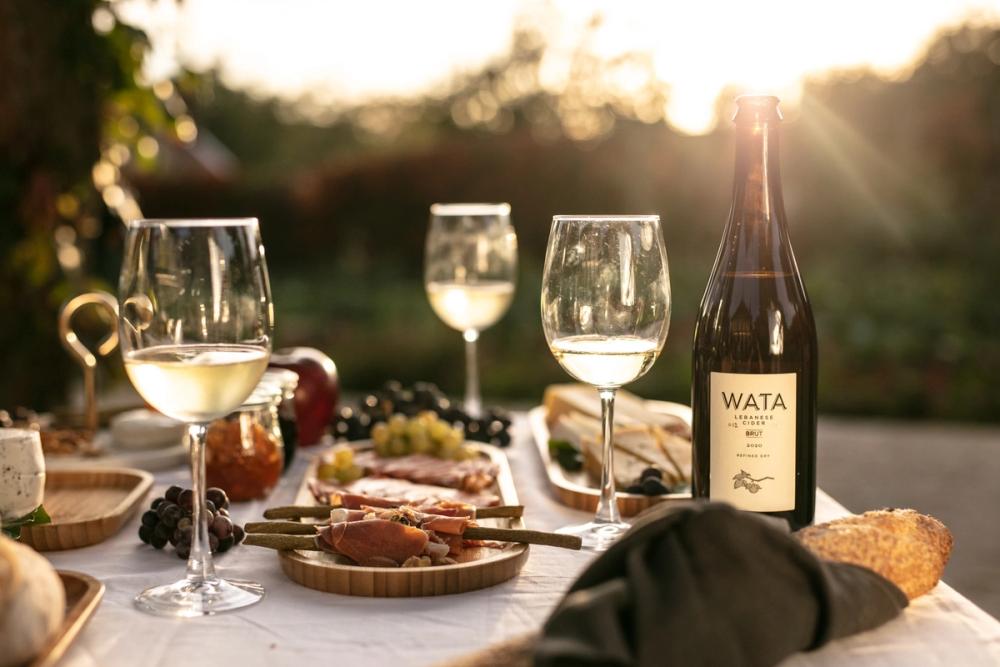
WATA Cider wants to make cider that can replace wine on a dinner table
We're increasingly exploring the impact of malolactic fermentation on our ciders and integrating it as a pivotal stage in crafting some our base ciders. Our aim is to produce refined ciders that authentically reflect our terroir. As vintages vary, we want to uphold the unique character and originality of each while ensuring consistency in the consumer's experience.
You are heavily involved in sustainability programmes - what are you doing?
Our ciders are exclusively crafted from fresh fruit, never from concentrate. We also follow these principles:
- Farming Practices: At WATA Orchards, we strictly adhere to sustainable farming methods to safeguard our environment and uphold the highest standards of fruit quality. Employing an Integrated Pest Management program (IPM), we minimize disruption to agri-ecosystems. As our production expands, so does our need for apples. Currently, 40% of our annual apple supply is sourced from neighbouring producers who also embrace IPM principles. Our goal, as we grow, is to support more farmers committed to clean and sustainable practices.
- Fair Trade Principles: We eschew dealings with large traders, opting instead to collaborate with small-scale traders, who, regrettably, in Lebanon, often find themselves at the mercy of larger entities. Accordingly, prioritising sustainable farming practices, fostering fairer trade and allowing for greater cooperation.
- Energy Sustainability: Our cidery operates entirely on renewable energy. Given Lebanon's significant infrastructure challenges, particularly the daily electricity cuts that compel many households and businesses to resort to generators, our transition to solar energy has rendered us completely independent from the national grid, thereby reducing carbon footprint and ensuring a consistent supply of power
- Educational Initiatives: We've developed educational programs for schools aimed at promoting awareness of the value of our terroir, sustainable agricultural practices, and fostering entrepreneurship in the agro-industry.
How and where are you selling your cider - mainly in Lebanon or in export markets too?
The majority - 70% - is sold in Lebanon and then 30% in European capitals including London, Paris, Madrid, Lisbon, Oslo, Zurich.
What price points do you have?
Wholesale price £2.50 for the 330ml bottles & £10.50 for the 750ml bottles.
Do you see your ciders as gastronomic and to be enjoyed with food or on their own as a drink or both?

Soha Frem has big ambitions for WATA Cider and Lebanese premium cider
Both of our ciders provide a delightful experience whether savoured on their own or paired with food. Their light tannin content makes them perfect companions, enhancing the flavours of dishes without overwhelming them. WATA has earned its place on bar menus and is being endorsed by renowned chefs in their restaurants.
For optimal pairing, we recommend enjoying the dry cider with seafood, oysters, white meat, and salads, while the fruity/sweet ciders complements cheese, cold cuts, spicy dishes, and fatty meats exquisitely.
What are your plans for the future in terms of growing the business and exploring new opportunities?
WATA is presently investing in a new cidery to expand our production volumes to be able to respond to the growing export market, and diversify our product range, particularly focusing on the non-alcoholic beverage sector.
Anything else to say?
We hope our ciders will authentically represent our terroir and passion, ultimately capturing the hearts of British consumers.
* WATA Cider is imported in the UK through Lebanese Fine Foods.
* For more information contact Madeline Waters on madeleine@weareco.co.uk.
